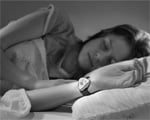Riding in school buses early morning, followed by sitting in poorly lit classrooms explains trouble getting sleep.

Circadian timing affects sleep onset. Delayed sleep onset can reduce sleep duration in adolescents required to awake early for a fixed school schedule. The absence of short-wavelength (blue) morning light, which helps entrain the circadian system, can hypothetically delay sleep onset and decrease sleep duration in adolescents.
To investigate whether removal of short-wavelength light during the morning hours delayed the onset of melatonin in young adults, researchers fitted eleven eighth-class students with goggles that blocked blue light for five days. They found that dim light melatonin onset was significantly delayed (30 minutes) after the five-day intervention, demonstrating that short-wavelength light exposure during the day can be important for advancing circadian rhythms in students.
Teenagers, like everyone else, need bright lights in the morning, particularly in the blue wavelengths, to synchronize their inner, circadian rhythms with nature's cycles of day and night. If they are deprived of blue light during the morning, they go to sleep an average of six minutes later each night, until their bodies are completely out of sync with the school day, the researchers explained.
The above findings provide a possible explanation as to why teenagers stay up too late at night, then fall asleep in class the next morning and perform poorly in scholastic activities.
DoctorNDTV is the one stop site for all your health needs providing the most credible health information, health news and tips with expert advice on healthy living, diet plans, informative videos etc. You can get the most relevant and accurate info you need about health problems like diabetes, cancer, pregnancy, HIV and AIDS, weight loss and many other lifestyle diseases. We have a panel of over 350 experts who help us develop content by giving their valuable inputs and bringing to us the latest in the world of healthcare.












